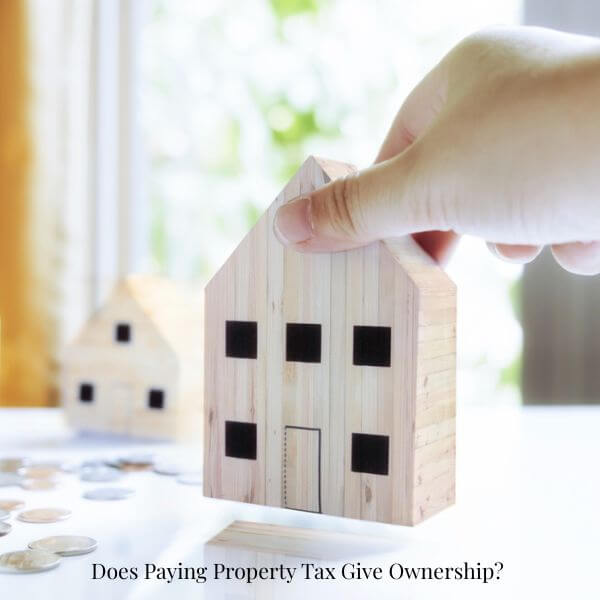Last Updated on November 5, 2025 by Amrita Das
Each year, millions of property owners make their property tax payments, believing they are fulfilling part of their obligation as owners. But here’s an interesting question that sometimes arises in real estate discussions: does paying property taxes give you ownership of a property?
This blog seeks to clarify this common misconception by explaining the legal differences between paying taxes and owning property. Read this guide(Does Paying Property Tax Give Ownership) to explore what property taxes really mean, how ownership is established, and the rights and limitations tied to these payments.

Understanding Property Taxes and Ownership
Property taxes are a financial obligation that property owners pay to local governments to fund public services like schools, emergency services, and road maintenance. While paying these taxes is a sign of responsibility, it does not inherently equate to ownership.
Here’s why:
- Ownership rights are established through legal documentation like deeds and titles.
- Paying property taxes may contribute to the upkeep of public services, but does not automatically transfer or grant legal ownership unless certain legal conditions are met.
This brings us to a related legal concept that sometimes confuses property taxpayers hoping to claim ownership rights: adverse possession.
What Is Adverse Possession?
Adverse possession is a legal doctrine that allows a person to claim ownership of property under specific conditions. The requirements vary by state, but typically, you must meet all of the following criteria:
- Continuous Use: You must occupy the property consistently for a required period (often 7 to 21 years, depending on state laws).
- Exclusive Use: The property must be used without the permission of the legal owner.
- Open and Notorious Use: Your occupation must be visible and obvious, not hidden.
- Hostility: This doesn’t mean aggression, but that your use of the property conflicts with the legal owner’s rights.
- Payment of Property Taxes: Paying taxes is often a crucial factor in making a claim for adverse possession.
If these conditions are met, you may be able to go to court and claim ownership of the property. However, adverse possession cases can be complicated, costly, and require substantial evidence.
To clarify this with an example, imagine someone moves into a vacant property, repairs it, uses it exclusively, and pays all of the property taxes for 20 years without the owner’s interference.
Under certain state laws, they might qualify for ownership through adverse possession. However, if the original owner contests the occupation, the adverse possession claim could fail.
Can You Claim Ownership by Paying Property Taxes? Does Paying Property Tax Give Ownership?
The Common Misconception
While paying property taxes may demonstrate a financial interest in maintaining the property, it does not substitute for a deed or other legal proof of ownership. The act of paying taxes is simply fulfilling an obligation to the government without affecting the property’s title.
Use as Supporting Evidence
If a property ownership dispute arises, property tax receipts might serve as supporting evidence to show a history of personal investment in the property. But they are not enough to confer ownership or settle the dispute on their own.
Tax Liens and Foreclosures
If a primary property owner fails to pay taxes, the taxing authority may place a tax lien and eventually auction the property to recover unpaid taxes.
In such cases, a person who pays off the taxes may acquire the property, but this is through a legal tax foreclosure sale process, not merely by paying taxes without other legal steps.
Consequences of Paying Property Taxes on Someone Else’s Property
Though well-intentioned, paying taxes on someone else’s property without additional legal actions has little to no impact on ownership. Here are two key scenarios where such payments might occur:
Mistaken Payment
If you accidentally pay property taxes on someone else’s property, you may be entitled to a refund or correction from the tax collector. However, this does not grant you ownership rights, as the law recognise such payments as errors rather than claims to property.
Gesture of Good Faith
Paying someone else’s taxes can also be seen as an act of goodwill or a way to prevent tax delinquency on a property you have an interest in. However, this act alone holds no legal merit in conferring ownership.
What About Co-Owners Paying Property Taxes?
When a property is co-owned, situations may arise where one co-owner pays the entire property tax amount. While this provides relief for other co-owners in financial difficulty, it does not result in the paying co-owner acquiring greater ownership stakes.
Instead, they may be entitled to reimbursement for their contributions. Legal mechanisms like partition actions could be used to resolve disputes in such scenarios.
Read More: How To Pay No Taxes On Rental Income? A Detailed Guide
Common Myths About Property Taxes and Ownership
Myth 1: Paying Property Taxes Automatically Equals Ownership
Truth: Payments alone do not confer legal rights to a property. Only a deed or title can prove ownership.
Myth 2: Adverse Possession Is Easy
Truth: Meeting the requirements for adverse possession is challenging. You cannot casually occupy unused property and hope to become the owner without meeting strict legal standards.
Myth 3: Owners That Don’t Pay Taxes Forfeit Their Rights
Truth: Owners may face consequences like liens or foreclosure for not paying property taxes. However, their ownership is not automatically nullified unless legal action is taken by the government or other interested parties.
Read More: Do Churches Pay Property Tax? A Comprehensive Guide
FAQ: Does Paying Property Tax Give Ownership?
Q: Does paying property taxes in California grant you ownership?
A: No, paying property taxes in California does not grant you ownership of a property. To obtain legal title to a tax-defaulted property under the Tax Collector’s authority to sell, you must successfully bid for it during the county tax sale.
Simply paying the outstanding taxes on such a property only assists the current owner and does not transfer ownership rights.
Q: Can paying property taxes in Georgia grant ownership rights?
A: No, paying current or delinquent taxes does not automatically increase your legal ownership of any real property in Georgia, including heirs property. It is essential to understand and follow the correct procedures for acquiring legal ownership of a property.
Q: Does paying property tax give ownership in Arkansas?
A: While paying property taxes is a necessary duty for property owners in Arkansas, it does not automatically give the ownership of the property. There are other factors and legal processes involved in obtaining ownership.
Read More: Do Renters Pay Property Tax?
Does Paying Property Tax Give Ownership? Final Thoughts
Paying property taxes is an essential part of property responsibility, but it does not guarantee ownership unless legal conditions are met. Complex scenarios like adverse possession exist, but they require more than just tax payments; they often demand decades of exclusive use, maintenance, and other challenging criteria.
Whether you’re dealing with multiple owners, interested in purchasing property through tax foreclosure processes, or hoping to claim ownership, always seek legal advice first. This ensures your efforts are guided by the right legal framework and increases your chances of achieving a fair outcome.
